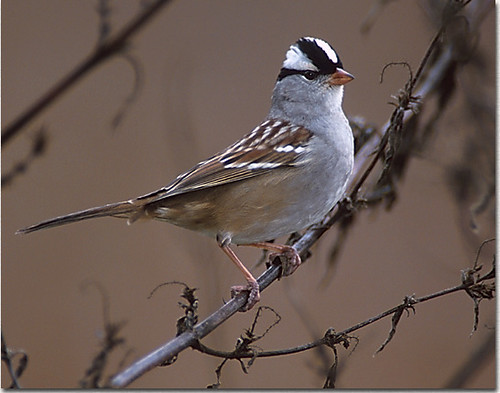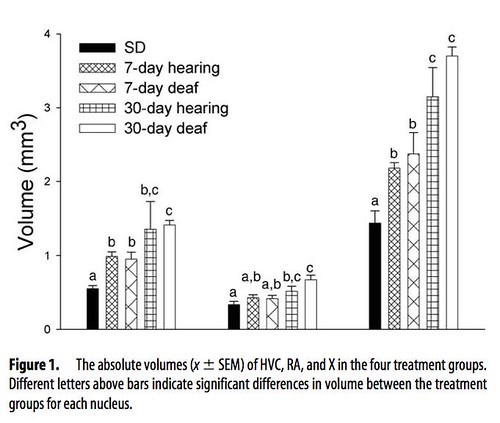tags: researchblogging.org, white-crowned sparrow, Zonotrichia leucophrys, steroids, brain growth
White-crowned sparrow, Zonotrichia leucophrys [song and other information].
Image: Birds of Oklahoma.
The first thing that most people think of when they hear the word "steroids" is baseball players who rely on these chemicals to increase their muscle mass and thereby improve their athletic performance. But recently, a small songbird that I studied for my dissertation work, Gambel's white-crowned sparrow, Zonotrichia leucophrys gambelii, has shown scientists that steroids trigger the growth of specific brain regions that support birdsong production (which my diss work also showed). These brain regions, known as song control nuclei, increase in overall size and add new neurons every spring under the influence of the naturally-occuring steroid, testosterone, when these birds sing to attract mates and defend territories. Additionally, and most interesting in my opinion, the researchers found that this increased growth in song control nuclei was not dependent upon environmental stimuli, such as hearing other sparrows' songs, nor apparently, did it even require that the sparrows could hear at all.
Eliot Brenowitz and his colleagues, Karin Lent and Ed Rubel, at the University of Washington in Seattle found that Gambel's white-crowned sparrows rely on testosterone to trigger seasonal growth of their song control nuclei. These findings are in contrast to some previous work with other bird species and with rodents suggesting that environmental factors can influence brain development and lead to growth of more neuronal connections.
"We would like to think that if we shape the environment, we can guide the brain's structure," explained Brenowitz, a professor of psychology and biology. "But the idea that experience can drive growth of the brain regions that control song behavior in birds was disproved by this study. You can change the experience and the behavior, but you don't change the structure of the brain."
To do this research, the team captured 19 adult male white-crowned sparrows during fall migration and for 12 weeks, the birds were housed under short-day light conditions that mimic winter. After this treatment, eleven of the birds then were surgically deafened. Then one week after the surgery, all of the birds were given testosterone implants and were exposed to long-day light conditions, similar to what they would encounter during their breeding season in Alaska, when they are in full song.
The team found that three song control regions, HVC, RA and X, in the deafened sparrows were just as large as those regions in normal sparrows (figure one, above). However, the deafened birds only produced one-eighth the number of songs that the hearing birds sang, revealing that seasonal growth of these song production areas of the brain do not depend upon hearing or high levels of song production.
"This is surprising to a lot of people because many thought seasonal growth of song nuclei was related to the rate of singing," said Brenowitz.
In sparrows, brain areas are directly stimulated to grow by steroid hormones, suggesting that such hormones might possibly help repair brain damage caused by strokes or neurodegenerative diseases in humans.
"This study suggests playing tapes of recorded speech to try to help a person recover language after a stroke might not be productive. But perhaps we could use neutrophins -- growth-inducing proteins whose synthesis by brain neurons is stimulated by testosterone," Brenowitz speculated.
This research was published in the July issue of the Journal of Neuroscience.
Sources
Original article: Auditory Feedback and Song Production Do Not Regulate Seasonal Growth of Song Control Circuits in Adult White-Crowned Sparrows (2007) by Eliot A. Brenowitz, Karin Lent and Edwin W. Rubel. Journal of Neuroscience 27(25):6810-6814; doi:10.1523/JNEUROSCI.1248-07.2007 (PDF) or abstract.
University of Washington press release (quotes)
UPI (quotes)



Gee you know such cool stuff. On a practical note I am not surprised...but still. Kind of ties in with the news on electrical stimulation of the man who was in a very low level of consciousness and given a second life.